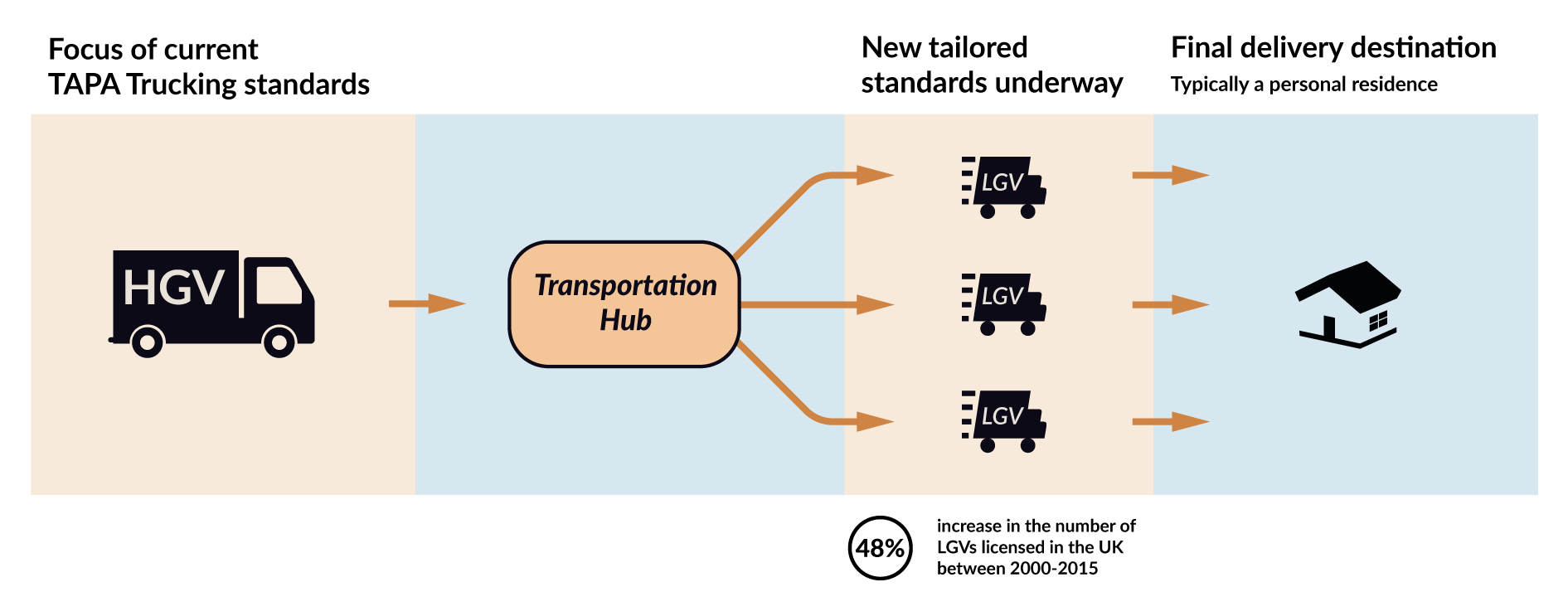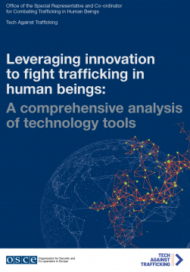Posted on 09 Jan 2020
The use of refrigerated containers and lorries in people smuggling and clandestine migration – which the Global Initiative forecasted would be an ongoing concern two years ago – raises questions for transport and logistics businesses. Widespread adoption of industry standards could pose a challenge to actors seeking to exploit the freight industry to move irregular migrants.
On 23 October 2019, the bodies of 39 Vietnamese migrants were discovered dead in the cargo hold of a refrigerated lorry in Essex, England. Twelve days later, Greek authorities found 41 Afghan migrants hidden in a refrigerated lorry. All were alive; seven were rushed to hospital and treated for breathing difficulties. The recent fatalities in the UK were certainly a tragedy, but it would be wrong to perceive this as an isolated incident.
What particular vulnerabilities are inherent in freight cargo that make this industry increasingly attractive to criminal networks that move people unlawfully across the Schengen borders and within the EU? And what actions can supply-chain operators take that will make their systems more resistant to exploitation by those coordinating smuggling activities, and, crucially, mitigate the protection risks faced by irregular migrants hidden in freight?
Recent cases show how the trucking industry is currently vulnerable to exploitation by those coordinating the smuggling of irregular migrants and refugees. This occurs both at the hands of external actors who infiltrate trucks without the knowledge of drivers, and from within, in cases where truck drivers are themselves key actors in smuggling networks.
Both threats could be mitigated by widespread adoption of trucking industry standards, significantly decreasing the protection risks faced by migrants using these dangerous transport methods.
Action is urgently required: a 2019 study by the European Commission found that trucks, particularly on routes moving from entry points along the Mediterranean towards key hubs, such as London and Paris, are ‘increasingly targeted’ by human smuggling networks, and that ‘the security risk’ of cargo being targeted by criminal
groups unbeknown to lorry drivers ‘has intensified and become more widespread’.
Where such risks materialize and networks successfully conceal irregular migrants in cargo, the cost is significant: drivers found to have stowaways in their cargo, regardless of whether they were aware of the stowaways (and thus complicit), or merely passive victims of infiltration, are liable to fines of £2 000 per person in the UK.
Data collected by BSI Supply Chain Solutions, a global provider of intelligence and audits designed to enhance supply chain resilience, found that in cases where European authorities seized a cargo shipment carrying stowaways, they typically arrested circa 17 stowaways per truck, suggesting that the average fine faced by the driver in such cases could be as high as about £35 000.
Although evidence of due diligence conducted by the driver, such as checking
seals on containers and implementing industry standards, can be treated as a mitigating circumstance and lower the level of liability, this remains largely at the
discretion of the law-enforcement authorities handling the case.
In order to mitigate the risk of trucks being used to move irregular migrants (either with or without driver complicity), and, crucially, to reverse the current trend, which tracks an increase in the frequency of migrants perishing in containers, it is valuable to consider the vulnerabilities across the entire logistics supply chain.
First we consider contexts where irregular migrants, and the smuggling networks facilitating their movement, infiltrate cargo without the knowledge of drivers or cargo operators.
Because the primary risk during land-based transits is theft, transport companies
take great care to secure containers, lorries and information. Drivers are
provided with only minimal information about what they are transporting – in
part as a further security measure. This heightens the risk that drivers will
be unaware that their cargo contains smuggled migrants. Detached cargo, which
is sealed at one point and then picked up by a driver at another, presents a
particular kind of vulnerability for drivers as, beyond checking that the seal
is untouched, the due diligence they can carry out as to the contents is
limited.
This was the case in an incident in October 2019, where 12 men were found alive in a refrigerated container truck in Belgium after the driver, who believed he was transporting fruit and vegetables, noticed that the seal on his cargo had been broken, became suspicious and called the police.
To supplement regulatory measures governing cargo transport and protection, the Transported Asset Protection Association, or TAPA, a network of 600 transport
companies, has set global security standards for compliance relating to goods being
transported on international roads. Among these are the Trucking Security
Requirements (TSR), which are updated annually. According to the TAPA guidelines, the TSR is ‘a tool intended for users and providers of trucking services’ providing a standard of security measures for transporting cargo, which can be used to form an agreement between shipper and carrier.
Each revision of the TSR takes into account law-enforcement feedback and technological developments. The next revision of the TAPA standards, due to be brought out in January 2020 and implemented later in the year, are expected to introduce more stringent requirements for locking mechanisms on trucks, in line with the evolution of new technologies. Poor locking mechanisms have been highlighted by the UK government as a particular vulnerability in the trucking industry, which facilitates infiltration and theft (although government comments were referring to vehicles arriving at ports unlocked, and thus not operating under TAPA standards, which already require stringent due diligence on locking mechanisms).
Currently, a new strand of trucking industry standards is being developed for the smaller vehicles used by transport companies to carry out so-called ‘last mile’ deliveries, demand for which has been stimulated by growth in consumer internet shopping.

Research shows that TAPA members experience lower levels of loss than non-members, while, simultaneously, the TAPA standards also reduce the risk of trucks and freight being infiltrated by migrants without the driver being aware.
The role of TAPA standards in addressing the risks of clandestine migration in trucks has been seen in high-risk areas, such as the port of Calais. Here, risk has been displaced, however, rather than eliminated. Enhanced security implemented at Channel ports, with trucking companies that operate in the area tightening up their procedures to mitigate the risk of clandestine migration, has driven the threat of illegal boarding of trucks and other vehicles inland across a wider area, leading to fragmented journey points at which greater security is required. To avoid such displacement – a phenomenon that has also been experienced in the creation of safe routes across a range of jurisdictions in the EU, which has meant that crime is displaced to alternative roads in the surrounding region – the implementation of such standards needs to be widespread.
A different kind of challenge is seen in cases where truck drivers are an active and knowing part of the smuggling network, as has been found to be the case for Mo Robinson, the driver of the lorry in which the 39 migrants perished in Essex in October. Robinson pleaded guilty to complicity in migrant smuggling
operations at the Old Bailey in November 2019. Given that industry trucking security standards are based on drivers implementing a wide range of checks on cargo, when the drivers themselves are complicit, the impact of such security measures is clearly diminished. It is not, however, entirely negated.
Industry logistics security standards, such as TAPA’s TSR, are designed to enhance the resilience of the entire supply chain, from manufacturer to consumer. Operators at different stages of the logistics supply chain will often subcontract elements
of the chain to other companies. Where manufacturers are TAPA accredited, they
are far more likely to use TAPA accredited operators at other links in the
chain, including trucking companies. This therefore leads to improved security being
applied across the entire supply chain, and its resilience to theft and
infiltration. On the one hand, this makes it extremely difficult for migrants
to infiltrate freight without the driver being alerted through their checks. On
the other hand, although such self-regulation does not in itself prevent a
driver or company from being complicit in the operation, it does require a
greater number of links in the supply chain to be compromised through
corruption and complicity with the crime groups that are behind smuggling,
theft or other forms of infiltration. In a case where only one rogue driver is complicit, the additional security checks conducted by upstream and downstream operators would greatly heighten the likelihood that the driver’s crime would be
discovered.
Widespread implementation of industry standards that rely on drivers and other operators across the transport logistics sector conducting and evidencing due diligence, such as the TAPA standards, will therefore not completely eliminate the risk of organized crime infiltrating supply chains, but it does mean that broader
levels of corruption across supply chain would need to be present to achieve those
criminal ends.
Supply-chain operators seeking to mitigate the risks of being involved in tragic incidents involving migrant fatalities, with ensuing damage to their corporate
reputation, should ensure they are accredited by recognized industry standards.
Governments should push for operators to comply with such industry standards across the logistics sector by committing to considering evidence of compliance with accreditation standards as a mitigating factor in cases of clandestine migration, and a lack of accreditation, or failure to comply with standards, as an aggravating
factor. Consequently, accreditation and compliance with standards could have
significant implications for potential liability faced by logistics companies
in cases of infiltration. This system of incentives and penalties could
accelerate adoption of, and compliance with, industry standards across the
supply chain, increasing its resilience to crime and corruption, while making
it more difficult for organized crime to disrupt operations.



